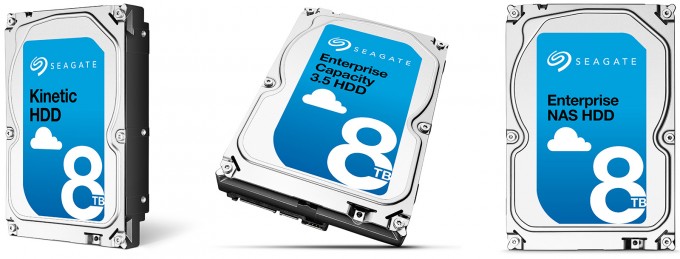- Qualcomm Launches Snapdragon 4 Gen 2 Mobile Platform
- AMD Launches Ryzen PRO 7000 Series Mobile & Desktop Platform
- Intel Launches Sleek Single-Slot Arc Pro A60 Workstation Graphics Card
- NVIDIA Announces Latest Ada Lovelace Additions: GeForce RTX 4060 Ti & RTX 4060
- Maxon Redshift With AMD Radeon GPU Rendering Support Now Available
Seagate Releases Trio Of 8TB Enterprise Hard Drives
In advance of the IFA show in Berlin, Seagate has pulled the veil off of three brand-new enterprise hard drive models. As the title of this post suggests, all of them come in at 8TB, helping to feed the ever-increasing demand for more storage in the same form-factor.
The three models include Enterprise Capacity 3.5 HDD, Enterprise NAS HDD, and Kinetic HDD. Seagate says that when it came to the development of these drives, it covered all possible angles to make sure that either one of them will perfectly suit a wide variety of business needs. Scott Horn, Seagate’s VP of Marketing, backs that up by saying, “In designing our products, we look closely at the type of data being stored, performance needs, power requirements, environmental operating conditions, network topologies, uptime demand and more, to ensure our customers receive the right storage technology for the job.”
That sounds good – but which of these three drives is right for your business?
The Enterprise Capacity 3.5 HDD is designed for bulk storage, such as with a cloud environment. While that might make it sound like the performance might be throttled back, Seagate notes that these new drives perform 100% faster with random transfers than the previous generation.
The Enterprise NAS series is designed for small- and medium-sized businesses, and allows them to vastly increase their storage density while saving space, and reducing power consumption (and of course, heat). As with all NAS drives, this new one is designed for constant operation.
Kinetic HDD is the final 8TB drive launched here, and is designed for huge deployments where fast performance is imperative. These Ethernet-capable drives focus on reducing the total cost of ownership, and are used through the Kinetic Open Storage platform. CERN’s Deputy Leader of the Data and Storages Group seems pleased with Seagate’s latest product, “As part of our collaboration through CERN openlab, we are aiming to demonstrate with Seagate the expected TCO and scalability benefits of Kinetic drives. These tests are being performed within the 100PB-scale storage setups that CERN deploys for the Large Hadron Collider.”
If CERN relies on these drives, I think it stands to reason that you might be able to trust them for your next 100 petabyte project as well.
Seagate hasn’t given word on when these new drives will be available, or what their pricing looks like.





